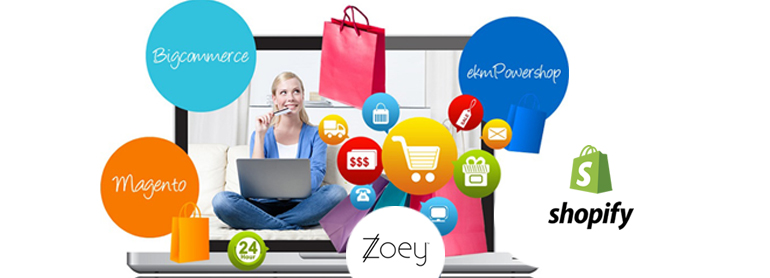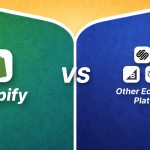Contents
If you are planning to sell your product from a website, then the first and most obvious question that will come into your mind – Which is the best eCommerce platform or most appropriate eCommerce platform for your business?
You may not want the opportunity to give the best online launch to your product by choosing an inappropriate platform so it becomes very important to do some research first and analyze to know more about different options available. It may take some time, but it worth.
Based on the changing technology, competition between different available platforms and requirement of eCommerce users, it’s not easy to answer that which is best eCommerce platform for a particular user.
There are so many options available. Most of the time users prefer to go with the trending ecommerce platforms like Shopify, Bigcommerce or Magento. Shopify is the most popular among all available eCommerce platforms, though, its true. You can see the Google trends graph below to compare between these platforms.
Clearly, Shopify is the winner. Let’s talk about all of these platforms and some other platforms as well which are not in trends but definitely growing their customer base very fast.
Shopify
Shopify has 3 pricing structures which they updated recently in 2025. Pricing is $29, $79, and $299 for Basic, Shopify (previously called Premium), and Advanced plans respectively. All three plans come with different features and offerings, so customers can choose based on their specific needs.
If you are a startup and just launching your store, you can go with the Basic plan, which is budget-friendly and offers all the essentials. On the other hand, if you’re planning to launch a large-scale store and expect higher traffic and sales volume, then it’s better to go for one of the higher-tier plans.
Basic plan is perfect for startups who don’t want to invest a fortune initially — and rightly so. We understand that budget is always a constraint while launching an online business. You’ll also need to reserve funds for marketing, app integrations, product inventory, and other essentials. The good part is, you can always upgrade your plan anytime as your business grows.
Transaction Fee – A Critical Point to Consider
This is an important factor to keep in mind while selecting any eCommerce platform.
Shopify offers 0% transaction fees only if you use Shopify Payments (its own payment gateway). However, Shopify Payments is powered by Stripe, which still charges a credit card processing fee — usually around 2.0% to 2.9% per transaction depending on your country and the type of card used.
That means while Shopify itself doesn’t charge you a transaction fee with Shopify Payments, you’re still paying Stripe’s standard processing fees, which might be costly in the long run, especially for high-volume stores.
👉 Always compare these costs across different platforms — transaction fees can significantly affect your net revenue.
You should also check the discussion on this forum about Shopify’s pricing and transaction policies here:
📌 Shopify Plans & No More Transaction Fees Discussion
This might be a deciding factor in your eCommerce platform selection process.
Bigcommerce:
Bigcommerce is also one of the top eCommerce platforms available online. This is the second most popular hosted platform after Shopify. The overall interface of admin panel is similar to Shopify and it offers most of the features that Shopify provides. The difference is that it provides a few more features than Shopify and those are very important features.
We have been using Bigcommerce from years and it provides so many features which are really important for the standard eCommerce website.
A: Product Options: Bigcommerce provides the flexibility to add several product variants in your products if your products come into many different size, color, material and other variants. If you own a large store and have a large inventory of products then its important feature to have so many variants. Shopify lacks here that it provides only 3 variants to be added and it ends with a total number of variants by 100. You cannot add more than 100 variants. So Bigcommerce is definitely a winner here in terms of features.
B: Abandoned Cart Recovery: Bigcommerce and Shopify both have this feature that the system sends an email to the customers who add products to cart but do not complete the purchase. Abandoned cart feature is arguably the most important feature for every eCommerce website and allows to recover 15% of lost sales as per the different surveys and analysis.
The major difference between Shopify’s abandoned cart system and Bigcommerce’s abandoned cart system is that, Shopify send only 1 email to users who abandoned their cart and Bigcommerce allows you to send 3 emails. You can schedule these emails as per requirement so possibility of recovery is more in Bigcommerce. Bigcommerce wins over Shopify in this feature. Its an important feature for websites with high traffic.
Other than that, Shopify and Bigcommerce offers almost similar features and payment structures. You can select either platform based on your needs but we recommend Shopify over Bigcommerce.
Woocommerce:
All the above-listed ecommerce platforms are hosted platforms where you dont have to buy hosting, no need to worry about site security, down time, support etc. If you want to go with some self-hosted platforms like WordPress, or you were already using WordPress cms and want to integrate ecommerce into it instead of redoing the whole site into other platforms, then you can go with Woocommerce.
Woocommerce is the most popular and widely used Ecommerce plugin for WordPress that integrates eCommerce features to your WordPress based website. Woocommerce has all the features that’s needed for a standard eCommerce website like payment gateways, shipping methods, inventory management, product variants, order management and many more.
Woocommerce is a Free plugin that you can use, but if you want to integrate some features that are not available in the plugin, then you can also buy those add-ons for a small fee.
If you are just starting your eCommerce business then you can go for Woocommerce easily. Later you can upgrade to other platforms but its good for a start.
Magento:
Magento was purely built for Ecommerce websites. Whether you want to launch a small scale store or a large ecommerce store, Magento is one of the best platform available in self-hosted ecommerce platforms list. People are using Magento from years and it has evolved over the years in terms of features and user experience.
Magento still holds top position among Best Ecommerce Platforms available. You can still compare it to Shopify and other big names in the list. There is no fee to use Magento, you can download it and use it for your website. You may have to hire a professional web developer or company to do your website in Magento as its not that easy like Shopify or other platforms.
Although there are so many templates available online which you can use, but still hiring a professional to setup your site is a wise decision.
Check some of the key features of Magento below:
Wix Ecommerce:
Wix is another growing eCommerce platform that deserves attention, especially for beginners and small business owners looking for simplicity and design flexibility. Originally known as a website builder, Wix has evolved into a capable eCommerce solution with powerful built-in tools. It offers a user-friendly drag-and-drop interface, allowing users to design visually stunning online stores without any coding knowledge.
Wix also includes essential eCommerce features such as inventory management, multiple payment gateway integrations, abandoned cart recovery, and multichannel selling through platforms like Facebook, Instagram, and eBay. One of the standout features of Wix is its collection of professionally designed templates, all of which are mobile-responsive and customizable to match your brand identity.
While Wix doesn’t charge any additional transaction fees on top of what the payment processor takes, it offers its own gateway—Wix Payments—along with support for Stripe and PayPal. In terms of pricing, its business plans start at around $27/month, which includes secure payments, a free domain for one year, and hosting. Wix is ideal for entrepreneurs who want to launch quickly, focus on aesthetics, and grow gradually with a platform that keeps things simple yet effective.
Conclusion:
There is no single eCommerce platform that perfectly fits every business. Each comes with its own strengths and weaknesses depending on your needs, technical skills, and budget. Shopify is great for most users due to its ease of use and support, BigCommerce is ideal for feature-rich stores, WooCommerce works well for WordPress users, Magento is powerful for large, complex stores, and Wix eCommerce is a fantastic entry point for beginners and design-focused sellers. Evaluate your priorities and choose accordingly.
Share this article if you like it. 🙂









